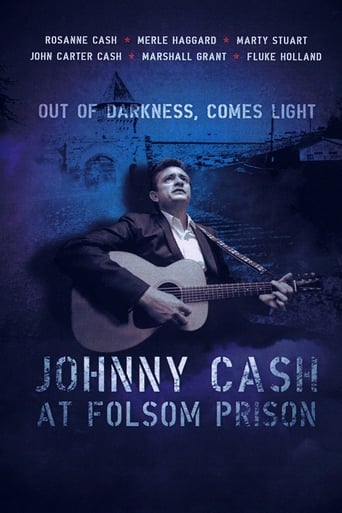davefoc-1
I agreed with all the negative reviews above, but I didn't care. I liked this documentary. It had lots of Johnny Cash music so I was probably going to like it no matter what. But there was more. I thought they did a nice job with using pictures taken from the concerts to tell the story. Sure video would have been nice, but if there wasn't video what they did was at least entertaining.I agree that some of the animation wasn't always appropriate to the story they were telling, but again, I didn't care. I enjoyed it.And they told several interesting stories in the course of the documentary. The story of Glen Sherley was very interesting to me and I looked him up and found out a bit more about him. I also enjoyed the comments from Cash's friends and family.Overall, if you can get past the imperfections that people pointed out above, you're going to enjoy this documentary.
jc-osms
The problem with this documentary on Johnny Cash's famous concert at Folsom Prison of course is that there is no video footage of the event itself. Yes, there are audio tapes of rehearsals, stills photography and naturally the record itself but when the producer has to resort to fleshing out the story of the concert with a featurette on Glen Sherley, the convict whose song Cash played at the concert and to whom Cash attempted to give encouragement on his release, as well as a potted history of the man himself, you feel that there's too much padding here.Worse, it resorts to using animated sequences to illustrate some of the songs, an approach completely at odds with the seriousness of the subject matter. As far as the interviewees are concerned, these fall into two categories, the admiring but critical (Merle Haggard in particular) and the fawning and largely uncritical (almost everyone else, including his band and family), which only gets worse when they extend their comments to eulogise Cash's wife, June.Some intelligent use is made of historical, typically no bullshit voice-overs by the man himself and there's no question the music and his performance are great, but I think on the whole, this documentary doesn't serve its subject over-well and would instead recommend the "San Quentin" documentary, a snippet of which is enticingly included here, to admirers.
evening1
I'd expected a black-and-white concert film here (though admittedly this doc dates to 2008), but found more than that.This film takes us back to the Sixties when Johnny Cash, June Carter Cash, and their band performed in the sprawling dining hall of Folsom Prison. It was Johnny's attempt at a comeback and he could not have had a more appreciative crowd in this place where, as a former inmate put it, "everything is limited and restricted...You're not a human being decent enough to be talked to in a decent manner." Cash wasn't an ex-con himself but he was empathic to the prisoner's plight and a surprising number of his songs tried to provide the jailed man's perspective. (He draws applause when singing the controversial line "I shot a man in Reno just to watch him die...") The film takes an intriguing detour into the checkered life of Glen Sherley, a career criminal who aspired to songwriting. Cash sang one of his songs at the Folsom concert and got Sherley an early release -- only to get scared by some of the violent things the ex-con started saying. (Cash sent Sherley packing and Sherley killed himself years later.) The movie says some thoughtful things about imprisonment, rehabilitation, and the futility of trying to save someone who doesn't want to be saved. And the music is superb -- particularly when Cash and June Carter perform together. If it has one flaw, it's that there's too much talk here and not enough of Cash's unique artistry.Still,this film is well worth seeing and remembering.
dromasca
Despite the public image fed by his songs, and despite offenses that led him in jail for one night stands Johnny cash was never convicted and never did time in prison. He did know understand however very well the conditions of imprisonment of detainees and he understood their feelings. Having seen a 1951 film dedicated to the Folsom Prison, one of his first songs was 'Folsom Prison Blues', but it was only more than one decade later - in 1958 - that he did perform in the prison in a recorded concert that gives the title of this film.Much of the film includes biographical information about Cash, and about the penitentiary system in America that Cash made great efforts to humanize and reform. Cash believed that any human being can be redeemed, even the worst criminals who committed horrific crimes, and he turned his conviction in deeds, not only by giving concerts in jails, but also by becoming personally involved in activities to reform the system, and befriending and personally helping - with mixed success - a number of prisoners. There are more interviews with the people who were helped by Johnny Cash or were related to the prison system than musical information, and some music fans who were expecting a pure musical film may get disappointed. I actually think that this is the interesting part of the film, and there is enough good music left as well I especially liked the two animated clips on original music. The only missing stuff in my opinion is the lack of filmed sequences from the concert itself, but maybe there is none left. There is enough biographic information though to compensate this.


